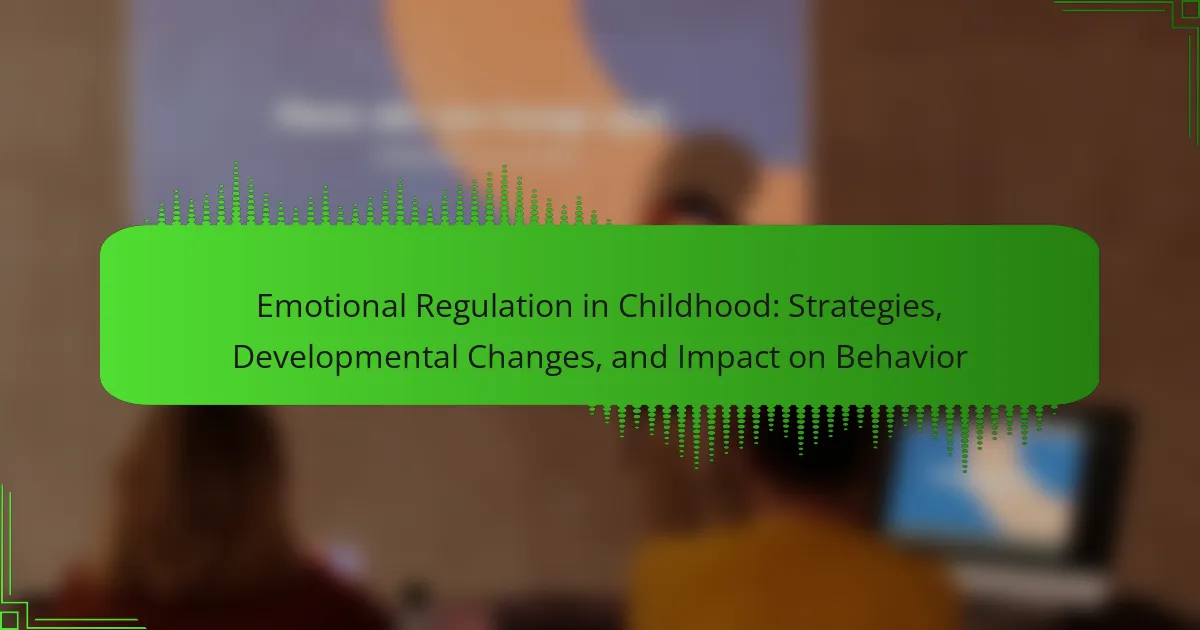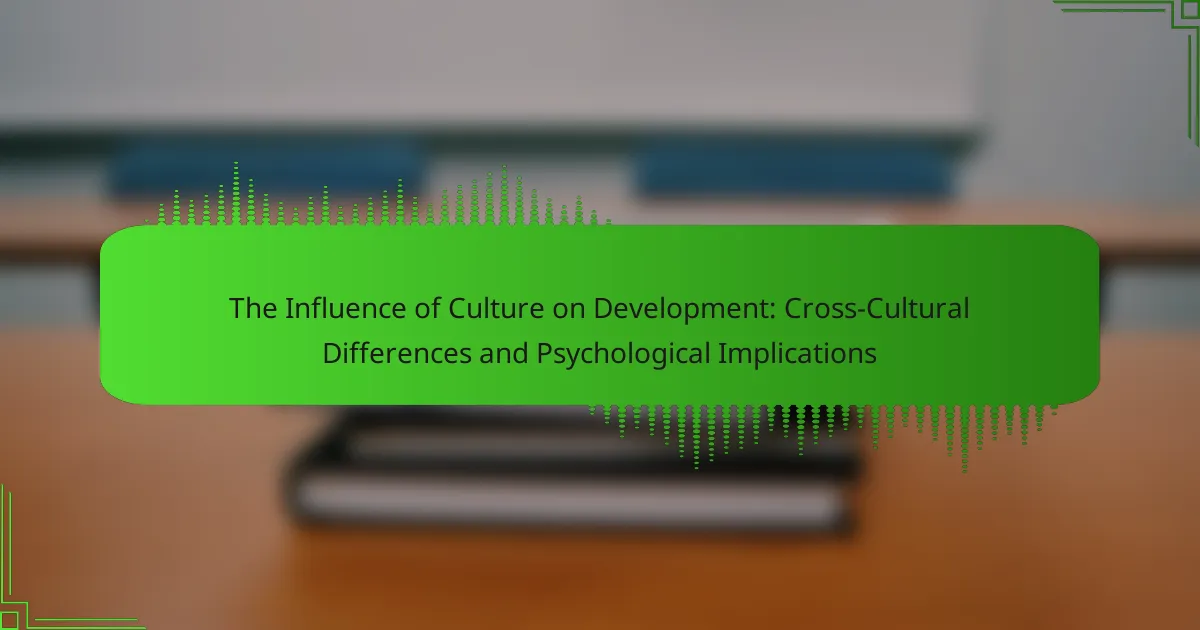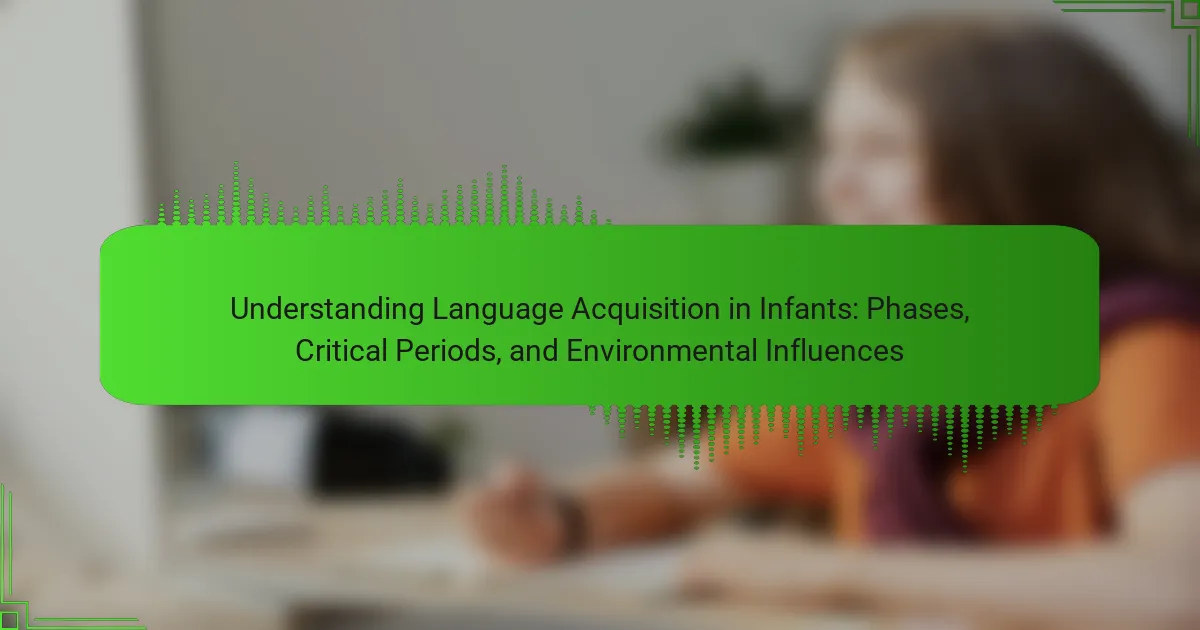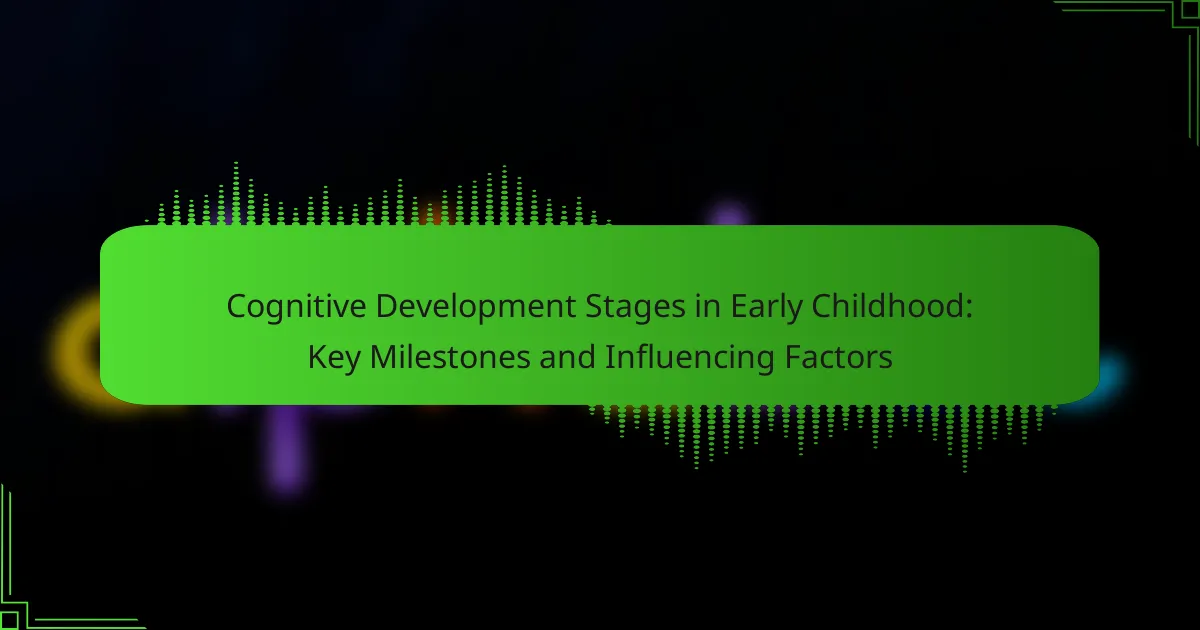Emotional regulation in childhood is the ability of children to effectively manage and respond to their emotional experiences. This process involves recognizing emotions, understanding their origins, and employing coping strategies. The article explores the significance of emotional regulation, highlighting its impact on social skills and academic performance. It discusses various strategies to enhance emotional regulation, such as mindfulness techniques and consistent routines, and examines developmental factors like cognitive growth and social interactions that influence this ability. Research findings underscore the importance of fostering emotional regulation during early development to promote healthier emotional outcomes in children.
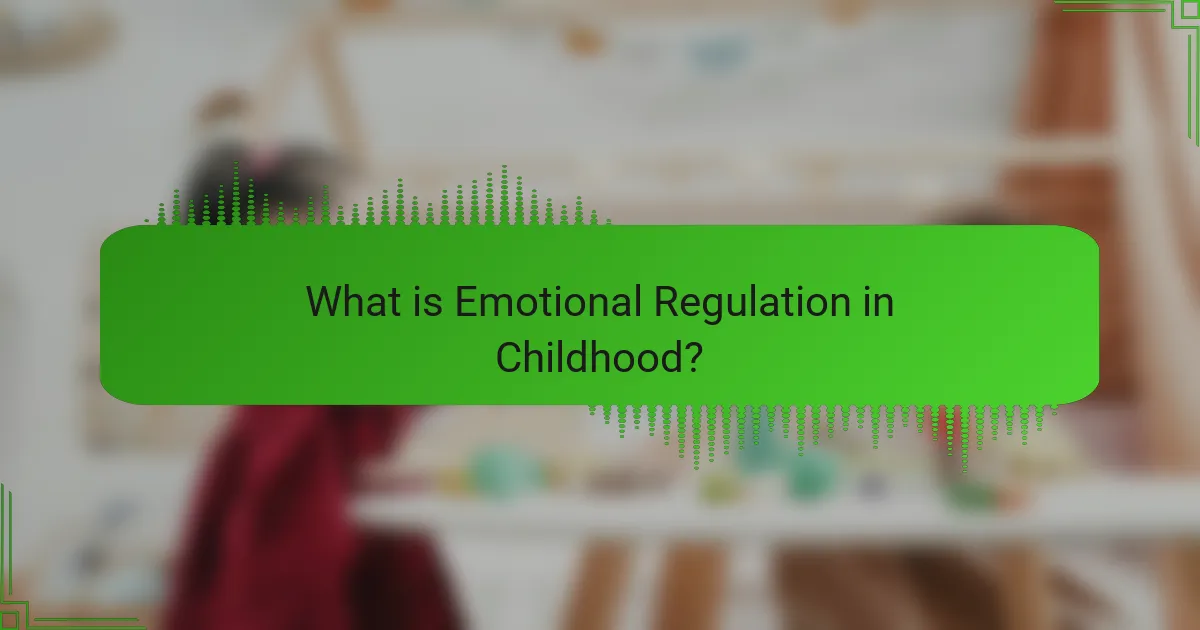
What is Emotional Regulation in Childhood?
Emotional regulation in childhood refers to the ability of children to manage and respond to their emotional experiences effectively. This includes recognizing their emotions, understanding their causes, and employing strategies to cope with them. Children develop emotional regulation skills through interactions with caregivers and social experiences. Research indicates that effective emotional regulation is linked to better social skills and academic performance. For example, a study published in the Journal of Abnormal Child Psychology found that children with strong emotional regulation skills were less likely to exhibit behavioral problems. This highlights the importance of fostering emotional regulation during early development.
How is Emotional Regulation Defined?
Emotional regulation is defined as the process of monitoring and managing emotional responses. It involves recognizing emotions, understanding their triggers, and implementing strategies to influence them. Effective emotional regulation helps individuals respond appropriately to emotional experiences. Research indicates that children develop emotional regulation skills over time, influenced by their environment and interactions. For instance, studies show that children who practice emotional regulation exhibit better social skills and academic performance.
What are the key components of Emotional Regulation?
The key components of emotional regulation include awareness of emotions, understanding emotions, and the ability to manage emotions. Awareness of emotions refers to recognizing one’s emotional states. Understanding emotions involves comprehending the causes and effects of these emotions. The ability to manage emotions encompasses strategies to modulate emotional responses. Research indicates that effective emotional regulation is linked to improved social skills and academic performance in children. Studies show that children who develop strong emotional regulation skills tend to have better mental health outcomes.
How does Emotional Regulation differ from emotional expression?
Emotional regulation involves managing and responding to emotional experiences, while emotional expression refers to the outward display of those emotions. Emotional regulation includes strategies to control the intensity and duration of feelings. For instance, a child may use deep breathing to calm down after feeling angry. Emotional expression, on the other hand, is how emotions are communicated, such as crying when sad or smiling when happy. Research shows that effective emotional regulation can lead to better social interactions and academic performance in children. In contrast, poor emotional expression can result in misunderstandings and conflicts. Thus, emotional regulation is about control, while emotional expression is about communication.
Why is Emotional Regulation Important for Children?
Emotional regulation is important for children because it helps them manage their emotions effectively. This skill enables children to respond to situations in a balanced way. Children who regulate their emotions are better at coping with stress. They tend to have improved social interactions and relationships. Research indicates that strong emotional regulation is linked to better academic performance. Studies show that children with good emotional control exhibit fewer behavioral problems. Additionally, emotional regulation contributes to overall mental health and well-being. It sets the foundation for resilience and adaptability in various life situations.
What are the long-term benefits of effective Emotional Regulation?
Effective emotional regulation leads to improved mental health over the long term. Individuals with strong emotional regulation skills experience lower levels of anxiety and depression. Research shows that these individuals often develop healthier coping mechanisms. They are more resilient in the face of stress and adversity. Effective emotional regulation also enhances interpersonal relationships. People who manage their emotions well tend to communicate more effectively. This skill fosters empathy and understanding in social interactions. Studies indicate that emotional regulation contributes to better academic and professional performance. Overall, the long-term benefits include enhanced well-being and life satisfaction.
How does Emotional Regulation influence social interactions?
Emotional regulation significantly influences social interactions by affecting how individuals express and manage their emotions. It enables individuals to respond appropriately to social cues. Effective emotional regulation fosters better communication and relationship-building. Research shows that children with strong emotional regulation skills often have more positive peer relationships. They are better at resolving conflicts and showing empathy. A study by Gross (2015) found that children who can regulate their emotions are more likely to engage in cooperative play. This ability enhances their social competence and overall emotional well-being. In contrast, poor emotional regulation can lead to misunderstandings and conflicts in social settings. Thus, emotional regulation plays a crucial role in shaping social experiences.
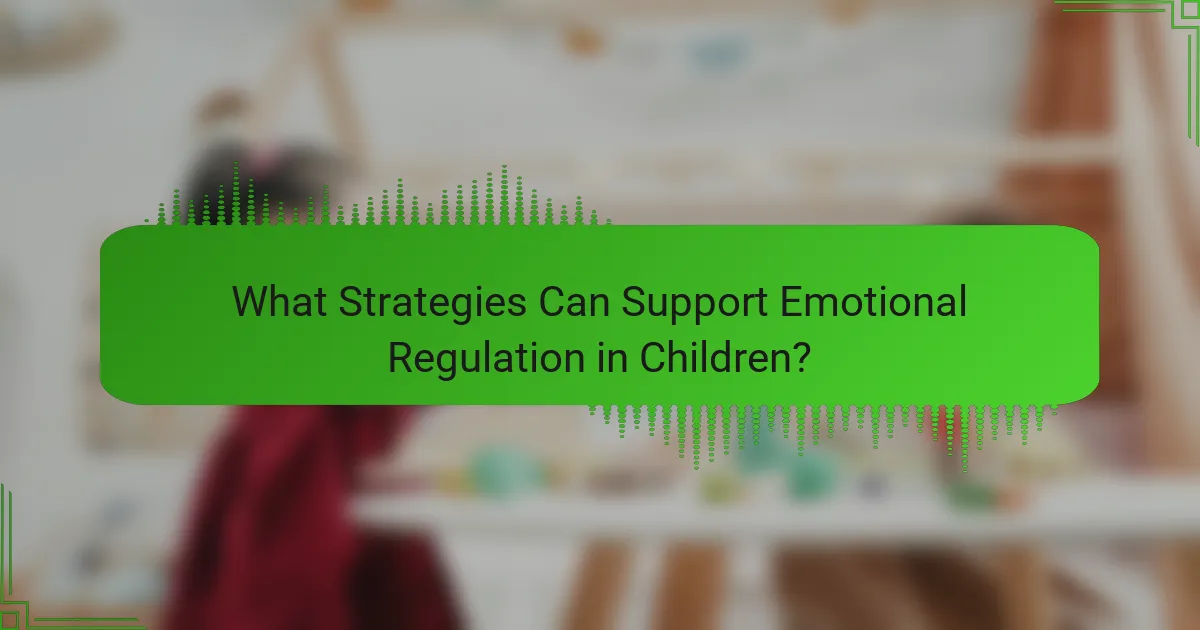
What Strategies Can Support Emotional Regulation in Children?
Strategies that can support emotional regulation in children include teaching mindfulness techniques, encouraging emotional expression, and providing consistent routines. Mindfulness techniques help children focus on the present moment. This can reduce anxiety and improve emotional awareness. Encouraging emotional expression allows children to identify and communicate their feelings. This practice fosters healthier coping mechanisms. Providing consistent routines creates a sense of security. Stability in daily activities helps children manage their emotions better. Research shows that these strategies enhance emotional intelligence and resilience in children.
What are the most effective techniques for teaching Emotional Regulation?
The most effective techniques for teaching emotional regulation include modeling, mindfulness practices, and cognitive restructuring. Modeling involves demonstrating appropriate emotional responses. Children learn by observing adults handle emotions effectively. Mindfulness practices help children become aware of their feelings. Techniques such as deep breathing and body scans promote self-awareness. Cognitive restructuring teaches children to challenge negative thoughts. This process encourages them to reframe their emotional responses. Research shows that these techniques improve emotional intelligence and coping skills. A study by Gross and Thompson (2007) indicates that emotional regulation is crucial for social competence.
How can parents model Emotional Regulation for their children?
Parents can model emotional regulation for their children by demonstrating healthy emotional responses. They should express their feelings openly and appropriately. For example, when feeling frustrated, parents can verbalize their emotions and explain their coping strategies. This teaches children to recognize and articulate their own feelings.
Additionally, parents can use role-playing to practice emotional scenarios. This method helps children understand different emotional responses. They should also encourage problem-solving discussions about emotional challenges. This approach fosters critical thinking about emotions.
Research indicates that children learn emotional regulation through observation of their parents. A study by Morris et al. (2007) found that parental emotional expression significantly influences children’s emotional development. Thus, parents’ actions and words are crucial in teaching emotional regulation skills.
What role do mindfulness practices play in Emotional Regulation?
Mindfulness practices play a significant role in emotional regulation. They enhance awareness of emotions and promote acceptance without judgment. This approach helps individuals recognize emotional triggers and responses. Research indicates that mindfulness can reduce anxiety and improve emotional resilience. A study published in the journal “Emotion” found that mindfulness training leads to better emotional regulation skills in children. Participants exhibited increased emotional awareness and reduced impulsivity after engaging in mindfulness exercises. These findings support the effectiveness of mindfulness in fostering healthier emotional responses.
How can educators implement Emotional Regulation strategies in the classroom?
Educators can implement Emotional Regulation strategies in the classroom through structured activities and clear guidelines. They can introduce mindfulness practices, such as breathing exercises, to help students manage their emotions. Regular check-ins can be conducted to assess students’ emotional states. Educators can also create a safe environment for students to express their feelings. Teaching coping skills, such as identifying emotions and problem-solving, is essential. Role-playing scenarios can help students practice these skills in real-life situations. Additionally, integrating social-emotional learning into the curriculum fosters emotional awareness. Research shows that these strategies improve students’ emotional regulation and overall classroom behavior.
What activities promote Emotional Regulation among peers?
Activities that promote emotional regulation among peers include group discussions, role-playing, and collaborative games. Group discussions allow children to express their feelings and learn from others’ experiences. Role-playing scenarios help children practice managing emotions in various situations. Collaborative games encourage teamwork and communication, fostering emotional understanding. Research shows that these activities enhance empathy and reduce emotional outbursts. Engaging in structured activities also provides a safe space for children to explore their emotions. These methods contribute to better emotional regulation skills over time.
How can teachers identify and support children struggling with Emotional Regulation?
Teachers can identify children struggling with emotional regulation by observing their behavior and emotional responses. Signs include frequent outbursts, difficulty calming down, and trouble managing frustration. Teachers should also note if a child has trouble focusing or interacting with peers. Regular communication with parents can provide additional insights into the child’s behavior at home.
To support these children, teachers can implement strategies such as creating a structured environment. A predictable routine helps children feel secure. Teaching coping strategies, like deep breathing or counting to ten, can also be effective. Providing a safe space for children to express their emotions is crucial.
Research shows that early intervention improves emotional regulation outcomes. A study by Zins et al. (2004) highlights the importance of social-emotional learning programs in schools. These programs equip teachers with tools to help children manage their emotions effectively.
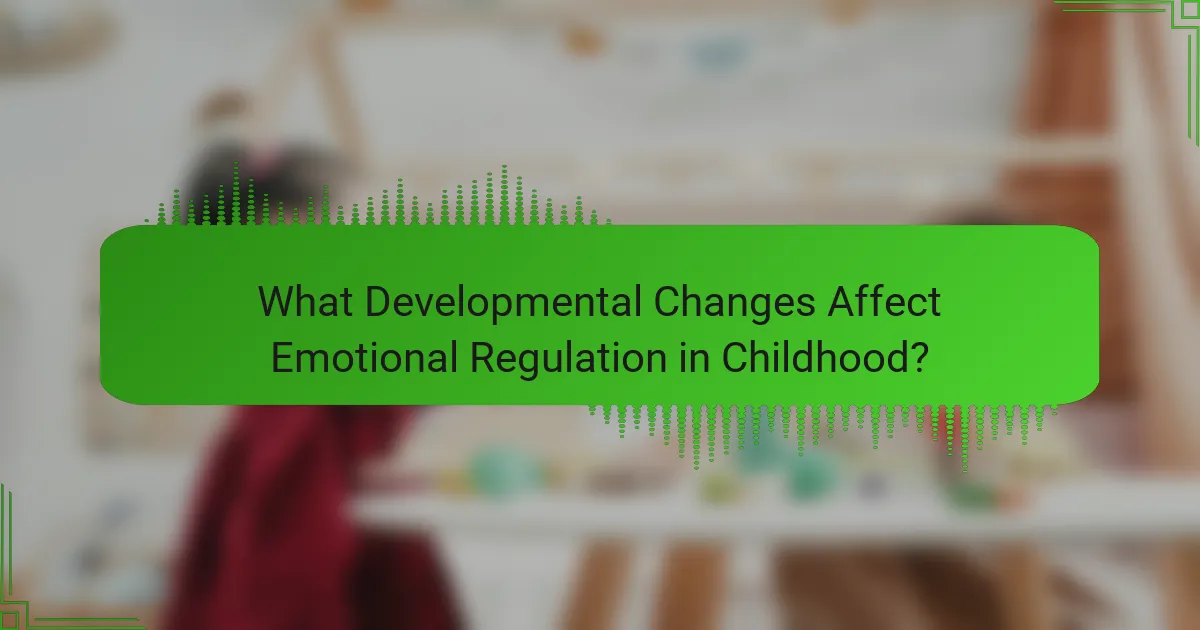
What Developmental Changes Affect Emotional Regulation in Childhood?
Developmental changes that affect emotional regulation in childhood include cognitive development, social interactions, and neurological maturation. Cognitive development enables children to understand and label their emotions better. As children grow, they learn to use language to express feelings, which enhances emotional regulation. Social interactions provide opportunities for children to observe and imitate emotional responses. Through these interactions, they learn appropriate ways to manage emotions. Neurological maturation, particularly in the prefrontal cortex, supports impulse control and emotional regulation. Research indicates that as children age, their ability to regulate emotions improves significantly. For instance, studies show that older children demonstrate greater emotional regulation skills compared to younger peers. These developmental changes collectively contribute to a child’s capacity to manage emotions effectively.
How does Emotional Regulation evolve as a child grows?
Emotional regulation evolves significantly as a child grows. Infants rely on caregivers for emotional support and often express emotions through crying. As children reach toddlerhood, they begin to recognize and label their emotions. This recognition allows them to develop basic coping strategies, such as seeking comfort from familiar adults. During preschool years, children start to use language to express their feelings, which enhances their ability to manage emotions.
By middle childhood, children become more adept at understanding others’ emotions and can employ strategies like distraction or problem-solving to cope with difficult feelings. Research indicates that emotional regulation skills are linked to social competence and academic success. As children enter adolescence, they often experience heightened emotional fluctuations due to hormonal changes. However, they also develop more sophisticated strategies for emotional regulation, such as cognitive reappraisal.
Overall, emotional regulation becomes more complex and nuanced as children grow, influenced by cognitive development, social interactions, and environmental factors.
What developmental milestones are associated with improved Emotional Regulation?
Developmental milestones associated with improved emotional regulation include increased self-awareness, enhanced impulse control, and better social understanding. Self-awareness typically develops around age 2, as children begin to recognize their own emotions. By age 3 to 4, children show improved impulse control, allowing them to manage reactions to frustration. Social understanding progresses around ages 4 to 5, as children learn to empathize with others’ feelings. These milestones contribute to a child’s ability to navigate emotional experiences. Research shows that children with stronger emotional regulation skills tend to have better social relationships and academic success.
How do age and maturity impact a child’s ability to regulate emotions?
Age and maturity significantly influence a child’s ability to regulate emotions. Younger children often lack the cognitive skills necessary for effective emotional regulation. As children grow, their brains develop, enhancing their ability to understand and manage emotions. Research shows that emotional regulation improves with age due to increased neural connectivity. For example, a study by Cole et al. (2004) found that older children demonstrate better strategies for coping with negative emotions. Maturity also contributes to social understanding, allowing children to empathize and respond appropriately to others’ feelings. Overall, emotional regulation becomes more sophisticated as children age and mature.
What challenges do children face in Emotional Regulation during different developmental stages?
Children face various challenges in emotional regulation during different developmental stages. In early childhood, they struggle with identifying and labeling their emotions. This can lead to outbursts when they feel overwhelmed. As children enter school age, they begin to understand social norms. However, they may still find it difficult to manage frustration and anger. During adolescence, emotional regulation becomes more complex. Teens often experience heightened emotions due to hormonal changes. They may struggle with peer pressure and identity issues, impacting their emotional responses. Research indicates that these challenges can affect academic performance and social relationships. Effective emotional regulation is crucial for overall development and well-being.
How do environmental factors influence Emotional Regulation in children?
Environmental factors significantly influence emotional regulation in children. These factors include family dynamics, socioeconomic status, and community environment. Supportive family relationships foster better emotional understanding and expression. Conversely, high-stress environments can lead to difficulties in managing emotions. Research indicates that children from stable homes exhibit healthier emotional regulation. A study by Eisenberg et al. (2001) found that positive parenting practices correlate with improved emotional regulation skills. Additionally, exposure to violence or instability in the community negatively impacts emotional coping strategies. Overall, the surrounding environment plays a crucial role in shaping how children learn to regulate their emotions.
What unique challenges do adolescents face regarding Emotional Regulation?
Adolescents face unique challenges in emotional regulation due to developmental changes. Hormonal fluctuations during puberty can intensify emotional responses. Brain development, particularly in the prefrontal cortex, affects decision-making and impulse control. Social pressures from peers can lead to heightened anxiety and stress. Adolescents often struggle with identifying and expressing their emotions accurately. They may lack effective coping strategies to manage intense feelings. Research indicates that emotional dysregulation is linked to increased risk of mental health issues. Studies show that adolescents with poor emotional regulation are more prone to depression and anxiety disorders.
What is the impact of Emotional Regulation on Behavior in Children?
Emotional regulation significantly impacts behavior in children. It helps children manage their emotions effectively. This management leads to better social interactions. Children with strong emotional regulation skills exhibit fewer behavioral problems. They are less likely to engage in aggression or disruptive behaviors. Research shows that emotional regulation correlates with academic success. For instance, a study by Eisenberg et al. (2001) found that children with better emotional regulation perform better in school. Additionally, emotionally regulated children have healthier peer relationships. They demonstrate empathy and cooperation more frequently. Overall, emotional regulation is crucial for positive behavioral outcomes in children.
How does poor Emotional Regulation manifest in behavioral issues?
Poor emotional regulation manifests in behavioral issues through increased impulsivity and aggressive outbursts. Children may struggle to manage their emotions effectively. This can lead to tantrums, defiance, and difficulty in social interactions. Research indicates that children with poor emotional regulation often exhibit higher levels of anxiety and depression. They may also display withdrawal from social situations and difficulty in forming relationships. A study published in the Journal of Abnormal Child Psychology found that poor emotional regulation is linked to conduct problems. This highlights the significant impact of emotional regulation on behavior.
What are the correlations between Emotional Regulation and academic performance?
Emotional regulation significantly correlates with academic performance. Students who effectively manage their emotions tend to achieve higher grades. Research indicates that emotional regulation enhances focus and reduces anxiety during exams. A study by Zins et al. (2004) found that emotional intelligence, which includes regulation, predicts academic success. Furthermore, students with high emotional regulation skills are better at coping with stress, leading to improved learning outcomes. In contrast, poor emotional regulation can lead to behavioral issues that negatively impact academic performance. Overall, effective emotional regulation is crucial for academic achievement.
What practical tips can help improve Emotional Regulation in children?
Encouraging emotional regulation in children can be achieved through several practical tips. Teach children to identify their emotions by naming them. Use simple language to help them express feelings. Encourage deep breathing exercises to calm down during emotional moments. Model emotional regulation yourself; children learn by observing adults. Create a safe space for children to discuss their feelings without judgment. Implement routines to provide structure, which can help reduce anxiety. Use role-playing to practice responses to different emotional scenarios. Reinforce positive behavior when children successfully manage their emotions. These strategies can significantly enhance a child’s ability to regulate their emotions effectively.
Emotional regulation in childhood is the ability of children to manage and respond to their emotional experiences effectively. This article examines the definition, key components, and importance of emotional regulation, highlighting its impact on social skills, academic performance, and overall mental health. It discusses developmental changes affecting emotional regulation, unique challenges faced by adolescents, and practical strategies to support emotional regulation in children. Additionally, the article explores the correlation between emotional regulation and behavioral outcomes, providing insights into how parents and educators can foster these skills for improved well-being.
